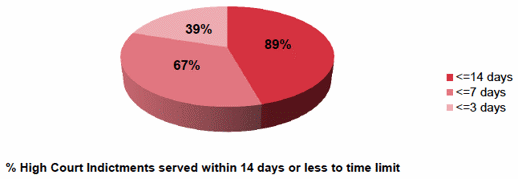Related Downloads
Related Links
Additional
Part 3: Overview
6. In our thematic report on the management of time limits, we concluded that managing time limits has become more complex with crime becoming more global, an increase in the volume of serious crime as well as a marked change in the profile of such cases, including a substantial increase in reports of sexual crime.
7. While the number of solemn cases has fallen slightly, [16] the proportion of sexual offences of the overall COPFS High Court workload has increased and now constitutes 71% of their caseload in comparison to 50% at the time the report was published. Overall the number of sexual crime charges has increased by 84% since 2010-11. In particular the number of charges of rape or attempted rape reported to COPFS has more than doubled since 2010. [17]
8. It is therefore more important than ever that there are robust systems to manage cases within time limits.
Service of Indictments
9. In the thematic report on the management of time limits, we reported that of the 181 accused persons who were served with an indictment for proceedings in the High Court after the nine month target period [18] in 2013/14, 55% were indicted within three days or less of the time limit. We concluded that any increase of cases being indicted out of target increased the risk of cases failing to comply with the statutory time limits.
10. Undertaking a similar analysis, over an equivalent time period, for accused persons who were served with an indictment for proceedings in the High Court after the nine month target period in 2016/17, [19] we found that of the 219 persons indicted after the nine month target, 195 (89%) were served within 14 days or less of the time limit, 146 (67%) within seven days or less and 86 (39%) within three days or less. [20]
11. Chart 1 provides a breakdown of indictments served within 14 days or less.
Chart 1

12. While the reduction from 55% to 39% of cases being indicted within three days of the time limit is positive and demonstrates a concerted effort to minimise indicting close to the time limit, there are a significant number of indictments still being served within seven days or less of the time limit.
Concluding Remarks
13. COPFS has implemented a substantial number of the recommendations made, resulting in:
- More robust procedures for recording, amending and monitoring time limits;
- Increased awareness of time limits that apply in different circumstances and forums; and
- Clarity for managers as to who is responsible for monitoring the progress of solemn cases.
14. The introduction of a new milestone with the focus on minimising cases being indicted close to the time limits has had some success although as noted above there is scope to reduce this further.
15. The three recommendations that remain outstanding do, however, have the potential to make a substantial difference.
- Late indicting of cases remains a significant risk. Electronic service of indictments would go a long way to mitigate this risk. With the introduction of the power to make provision for something to be done in electronic form through Acts of Adjournal, including serving or conveying any document (or copy), [21] we strongly urge COPFS to progress the introduction of electronic service of indictments as a priority. This has the potential, not only to simplify the process for serving indictments, but to incur savings for COPFS, and for the police in terms of man hours employed to physically serve indictments approaching the time limit.
- Recommendation 9 is intended to simplify the management of time limits for managers and eliminate the manual collection and inputting of data. The introduction of an upgraded MI Book will provide a uniform and consistent method of recording and obtaining accurate and up to date information in an electronic format.
- The report highlighted a lack of awareness on the part of some staff of the legal consequences of failing to progress cases within statutory time limits and the absence of training on the management of time limits and the relevant law. COPFS has developed a thorough and comprehensive training package covering all aspects of time limits. It also includes guidance and training on the new provisions being introduced by the Criminal Justice (Scotland) Act 2016 that apply to Sheriff and Jury proceedings, and it is currently intended that the training will be rolled out close in timescale to the implementation date for these new Sheriff and Jury provisions. The training will be attended by both legal and administrative staff with responsibility for the management and monitoring of time limits on a regular basis.
16. Bespoke training will undoubtedly increase the ability of all involved to effectively manage time limits. While it makes sense to deliver training on the new provisions relating to Sheriff and Jury procedures close to their implementation - currently planned for the end of the financial year - we understand that if there is any slippage to that timetable, COPFS will consider rolling out the time limits training separately. We see significant merit in such an approach given the potentially serious consequences that can follow non‑adherence to statutory time limits.
